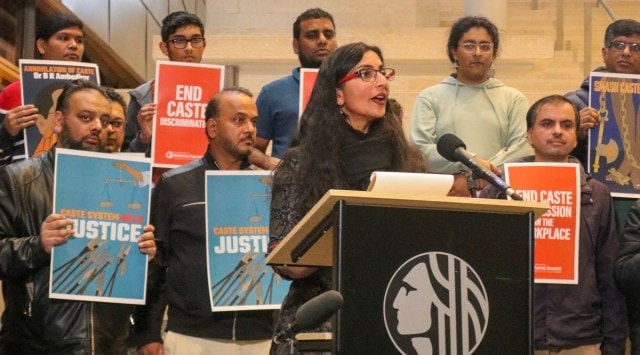Voice behind Seattle caste ban, Kshama Sawant: ‘Received outpouring of support’
On February 21, Seattle became the first city in the United States (US) to ban caste-based discrimination.
 Kshama Sawant in Seattle. (Express photo by Jesse Franz/ Seattle City Council)
Kshama Sawant in Seattle. (Express photo by Jesse Franz/ Seattle City Council) “We have testimonials of employees who have either faced derogatory remarks from their high-caste managers and bosses or, in some extreme circumstances, have been denied a raise and promotions because of their caste. We have seen such incidents taking place in American universities too, but reporting from these institutes is less,’’ said Kshama Sawant, the Seattle council member behind the introduction of the ordinance banning caste-based discrimination.
On February 21, Seattle became the first city in the United States (US) to ban caste-based discrimination. Since the ban, Indian-origin Sawant said she has received overwhelming response from across the country and even from across the pond in the United Kingdom (UK).
“I have received an outpouring of support from cities across the US and countries around the world with South Asian populations, in particular the UK. Organisations and ordinary citizens have gotten in touch with me, asking what needs to be done to achieve similar legislation in their cities,’’ the four-time council member told The Indian Express from Seattle.
The legislation prohibits businesses from discriminating based on caste with respect to hiring, tenure, promotion, workplace conditions or wages. Besides banning caste discrimination in places of public accommodation, such as hotels, public transportation, public restrooms and retail establishments, it will also prohibit housing discrimination in rental housing leases, property sales and mortgage loans.
The legislation has relied on the findings of a 2018 report by Equality Labs, ‘Caste in the United States: A Survey of Caste Among South Asian Americans’. Of the over 1,500 people surveyed, 24 per cent were Dalits and 18 per cent “shudras”. The report found that 25 per cent of the Dalits surveyed faced verbal or physical assault based on their caste, one in three Dalit students reported discrimination during the course of education, two out of three Dalits reported being treated unfairly in the workplace, 60 per cent Dalits faced derogatory caste-based jokes, 40 per cent Dalits and 14 per cent “shudras” were made to feel unwelcome in places of worship, and 20 per cent Dalits felt discriminated against at places of business.
“In the US, caste discrimination is not talked about as much. Of course, you wouldn’t have the kind of oppression and violence meted out to persons of lower caste like you would in India, but we have definitely been seeing more and more instances of caste discrimination here in the past 4-5 years, especially in the workplace. Discrimination occurs in other institutions as well, but the data that we have available and the testimonials are mostly from the workplace.
This is especially so in the tech sector, where we know such cases have occurred. Workers in this sector come forward because they are more emboldened, unlike in lower-income jobs where lower caste workers don’t talk about discrimination openly as often because of fear of reprisal,’’said Sawant.
According to a 2021 article by the Migration Policy Institute, 14.1 million immigrants from Asia were residing in the US as of 2019, representing a 29-fold increase from the 1960. Asians account for 31 per cent of the 44.9 million immigrants in the US. Since 2013, India and China have been the leading origin countries, displacing Mexico. In 2019, India, China and the Philippines were the top origin countries of immigrants from Asia, with 2.7 million Indians and 2.5 million Chinese (19 per cent and 18 per cent of Asian immigrants respectively).
Development on the legislation took only two months, said Sawant, adding that it was a natural consequence of the work her party had done since she first took office in 2014. “We are a small party and I am the only elected member, and we’re okay with that. We don’t have ambitions of becoming a national party. Our focus is bettering worker conditions and those of the common people, and not personal gain in [terms of] money or power, like it is for mainstream politicians …,” she said.
In 2014, Sawant pushed for an increase in minimum wage in the city to $15 and won. In 2020, she took on Seattle’s biggest corporation by launching the “Tax Amazon Campaign”. Once again, she succeeded. It led to the passing of the “JumpStart Seattle” tax in 2021.
Sawant has also successfully fought for renter rights in Seattle, including a legislation that mandates a 6-month notice to tenants by landlords before increasing rent and landlords paying tenants rent for 3 months in the event it is raised by over 10 per cent. “Seattle has one of the highest numbers of renters in the country. With more and more Americans unable to buy homes, unlike previous generations, due to higher cost of living, homelessness has been on the rise — in the US as a whole and in Seattle in particular. We needed to address this issue,” said Sawant, who is the Chair of the Sustainability and Renters’ Rights Committee in the Council.
However, it was the anti-Citizenship Amendment Act (CAA)-National Register of Citizens (NRC) resolution that she introduced in the Seattle Council in January 2020, after the Narendra Modi administration’s announcement, that served as a precursor to the ban on caste discrimination.
“After the Modi administration announced CAA-NRC, many Indian-American organisations, including the Indian American Muslim Council and the Global Indian Progressive Alliance, came together to urge the Seattle City Council to condemn it. We were joined by many south Asian organisations — Hindus, Muslims, Sikhs and Christians — as well as by non-South Asian workers’ unions in the movement. We faced stiff resistance from the Council, dominated by Democrats, who were angry that such a demand was being made. They had nothing to gain from condemning the CAA-NRC and wanted to stay neutral. The activists fighting for the resolution were surprised by this resistance,” recalled Sawant.
But the resolution was passed by the Seattle Council in 2020. So was a similar resolution, also led by Sawant, in support of the farmers’ movement in India. She said these battles united the South Asian community in Seattle, spurring them to take on an issue that has become increasingly visible — caste discrimination in America.
Over 100 representations were made, including an in-person representation from Prem Pariyar, an American of Nepalese descent who was instrumental in the ban against caste-discrimination at the California State University system, she said. Sawant was also joined by members of the Ravidass community from British Columbia in Canada.
Equating the movement with Black Lives Matter (BLM) and the movement against the upturning of Roe vs Wade (the right to choose abortion), she said, “All these movements are against oppression — whether it is gender or race or caste. Any fight can only be successful if there is mass movement by all sections of society. BLM is the biggest street movement in the history of the US. This is also because activists, workers and White people walked shoulder to shoulder with their Black colleagues. Roe Vs Wade is only successful if men support abortion rights as well as women. It is the same for caste. We have to ask ourselves if we want to live in a society which has caste discrimination. I am a Brahmin, but this is as much my fight as anybody else’s.’’
Sawant added that only a mass movement can compel bigger mainstream parties, whether the Republicans or the Democrats, to take note of the issue.
As far as Sawant’s next battle is concerned, she will not be running for the next Seattle Council election. “I have been in the Council for a decade. It is time to move on. It is time to take the movement national. On March 4, the Socialist Alternative will launch the Workers Strike Back campaign, addressing the cost of living crisis, discrimination and oppression,” she said.




- 01
- 02
- 03
- 04
- 05



























